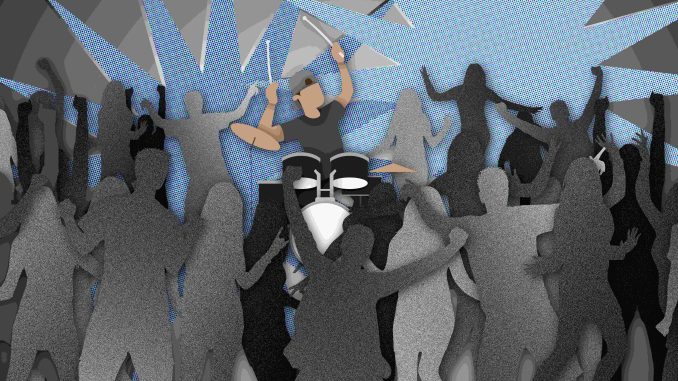
The first time I watched “The Sound of Metal” in 2021, I was on a strict diet of avocado toast, salads, eggs and fruit.
I was a dance major throughout high school, so I was unusually masterful at picking apart my visible flaws and comparing myself to others. Being in a dance studio for two to four hours a day meant I was constantly looking at myself in the mirror, analyzing the shape of my body, the arch of my back, the upward pull of my core and the straightness of my knees.
But I didn’t just see myself when I looked in the mirror. Instead, I saw my body surrounded by and in comparison to everyone else’s taller and narrower figures.
Throughout quarantine, I had nothing to occupy the space in my brain. I spend a lot of days staring at the wall, letting my thoughts run amok and conjuring up distant anxieties or dwelling on embarrassing interactions that took place years prior that I thought were proper grounds for self-loathing.
While taking a Zoom dance class one day, years of pent-up insecurities came crashing down and I had dedicated myself to starving within what seemed like minutes. There was no inciting incident; I just broke in an instant, like a hot glass getting cold water poured into it.
It was ultimately the result of years of insecurities and volatile internal dialogue that finally became too heavy in my chest to ignore.
My precision with what I ate was surgical. I went to bed with plans established for the next day, masterfully strategizing my exercise and caloric intake. My eating disorder slowly became one with my obsessive-compulsive disorder and was a necessity more than anything else.
After a few months, it became less about starving to be thin, but more about fears of contamination and food poisoning. I constantly saw videos on social media about the ingredients that would inevitably poison my gut or kill the bacteria in my stomach. I started to avoid more foods until my diet had the same diversity as a picky toddler.
I knew what I was doing was unhealthy and wrong, but I couldn’t seem to stop. Some days were better than others when I would drink a sugary coffee or expand my diet to include food I had never considered before.
But the incessant buzzing of doubt, shame and insecurity was constantly buzzing around me like a gadfly.
But one day, I sat down to watch “The Sound of Metal” to distract myself from the obsessions that plagued me. The movie follows a drummer named Ruben who goes deaf, but keeps playing the drums despite the damage it does to his hearing. He eventually joins a deaf community and learns ASL, but despite it all, he nearly decides to abandon all of his progress to get cochlear implants.
After being met with backlash from his deaf friends who contend that deafness is a culture, not an ailment, he decides against it. The final shot of the movie is the protagonist standing outside, he pulls his hearing aid out of his ear and revels in the silence of the world around him.
At its core, it’s about deafness, but broadly, it spoke to my frustrations. I had a mental problem that I couldn’t seem to fix, and it decimated my personality. The days when I had glimmers of hope that I was getting over it gave me the illusion of progress, but I would often slip back into my harmful habits the very next morning.
But from “The Sound of Metal,” I learned to take those negative days for what they are — just another day. I began to revel in those brief moments of silence from my vicious internal monologue. They became the patches of flowers in an otherwise wilted lawn that I was dancing on.
On the bad days that came, I would meditate on my negative feelings. In dialectical behavioral therapy, there’s an exercise where you view your painful thoughts as a balloon. Instead of trying to grab at the balloon’s string like a child, you’re encouraged to let it fly into the air. Some days, I tried to keep the balloons down on Earth with me, but with practice, I learned to release them.
When a good day came, I would celebrate it. Slowly but surely, good days became more frequent until the number of good days far outweighed the bad.
I’ve considered myself “recovered” for nearly a year, but I know the eating disorder’s ugly head will peer around the corner soon enough. Bad days are inevitable, but they’re not signs of regression.
I’ve learned to ride the rough days the same way I did with the rare good ones. It’s a constant ebb and flow that can pull you under like a riptide, but it’s most important to ride the wave and stay upright no matter the direction of the pull.
Like Ruben made peace with deafness, I’ve made peace with my eating disorder, if such a thing is even possible. I still have days where random anxieties creep up on me, but I’ve learned to let them pass and face the silence head-on.



Be the first to comment